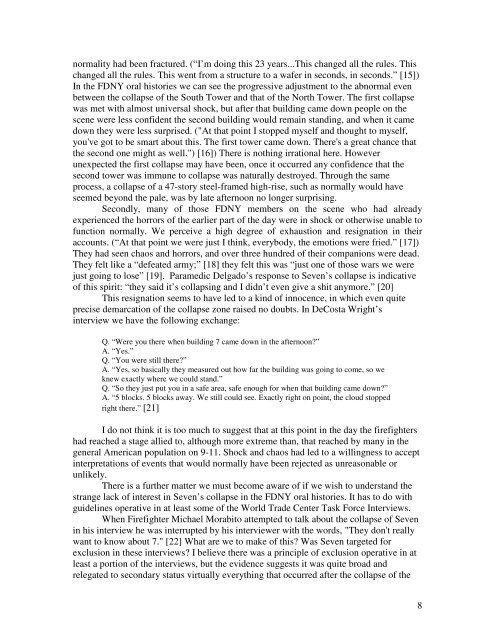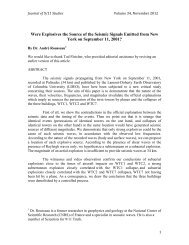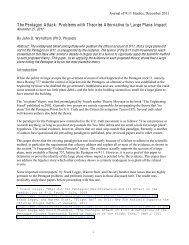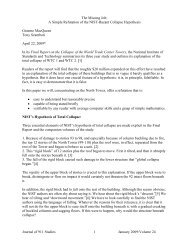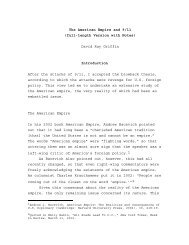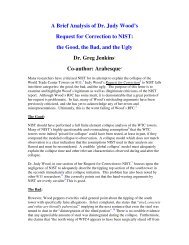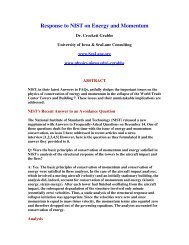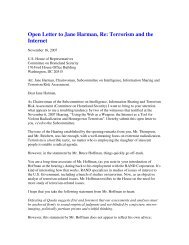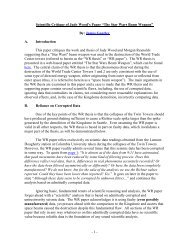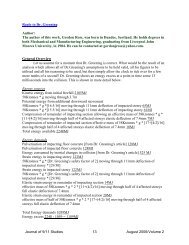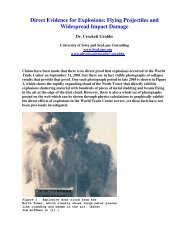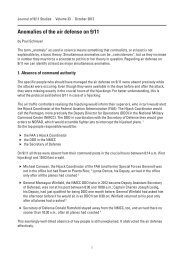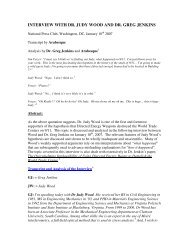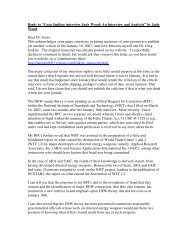Waiting for Seven - Journal of 9/11 Studies
Waiting for Seven - Journal of 9/11 Studies
Waiting for Seven - Journal of 9/11 Studies
Create successful ePaper yourself
Turn your PDF publications into a flip-book with our unique Google optimized e-Paper software.
normality had been fractured. (“I’m doing this 23 years...This changed all the rules. This<br />
changed all the rules. This went from a structure to a wafer in seconds, in seconds.” [15])<br />
In the FDNY oral histories we can see the progressive adjustment to the abnormal even<br />
between the collapse <strong>of</strong> the South Tower and that <strong>of</strong> the North Tower. The first collapse<br />
was met with almost universal shock, but after that building came down people on the<br />
scene were less confident the second building would remain standing, and when it came<br />
down they were less surprised. ("At that point I stopped myself and thought to myself,<br />
you've got to be smart about this. The first tower came down. There's a great chance that<br />
the second one might as well.") [16]) There is nothing irrational here. However<br />
unexpected the first collapse may have been, once it occurred any confidence that the<br />
second tower was immune to collapse was naturally destroyed. Through the same<br />
process, a collapse <strong>of</strong> a 47-story steel-framed high-rise, such as normally would have<br />
seemed beyond the pale, was by late afternoon no longer surprising.<br />
Secondly, many <strong>of</strong> those FDNY members on the scene who had already<br />
experienced the horrors <strong>of</strong> the earlier part <strong>of</strong> the day were in shock or otherwise unable to<br />
function normally. We perceive a high degree <strong>of</strong> exhaustion and resignation in their<br />
accounts. (“At that point we were just I think, everybody, the emotions were fried.” [17])<br />
They had seen chaos and horrors, and over three hundred <strong>of</strong> their companions were dead.<br />
They felt like a “defeated army;” [18] they felt this was “just one <strong>of</strong> those wars we were<br />
just going to lose” [19]. Paramedic Delgado’s response to <strong>Seven</strong>’s collapse is indicative<br />
<strong>of</strong> this spirit: “they said it’s collapsing and I didn’t even give a shit anymore.” [20]<br />
This resignation seems to have led to a kind <strong>of</strong> innocence, in which even quite<br />
precise demarcation <strong>of</strong> the collapse zone raised no doubts. In DeCosta Wright’s<br />
interview we have the following exchange:<br />
Q. “Were you there when building 7 came down in the afternoon?”<br />
A. “Yes.”<br />
Q. “You were still there?”<br />
A. “Yes, so basically they measured out how far the building was going to come, so we<br />
knew exactly where we could stand.”<br />
Q. “So they just put you in a safe area, safe enough <strong>for</strong> when that building came down?”<br />
A. “5 blocks. 5 blocks away. We still could see. Exactly right on point, the cloud stopped<br />
right there.” [21]<br />
I do not think it is too much to suggest that at this point in the day the firefighters<br />
had reached a stage allied to, although more extreme than, that reached by many in the<br />
general American population on 9-<strong>11</strong>. Shock and chaos had led to a willingness to accept<br />
interpretations <strong>of</strong> events that would normally have been rejected as unreasonable or<br />
unlikely.<br />
There is a further matter we must become aware <strong>of</strong> if we wish to understand the<br />
strange lack <strong>of</strong> interest in <strong>Seven</strong>’s collapse in the FDNY oral histories. It has to do with<br />
guidelines operative in at least some <strong>of</strong> the World Trade Center Task Force Interviews.<br />
When Firefighter Michael Morabito attempted to talk about the collapse <strong>of</strong> <strong>Seven</strong><br />
in his interview he was interrupted by his interviewer with the words, "They don't really<br />
want to know about 7." [22] What are we to make <strong>of</strong> this? Was <strong>Seven</strong> targeted <strong>for</strong><br />
exclusion in these interviews? I believe there was a principle <strong>of</strong> exclusion operative in at<br />
least a portion <strong>of</strong> the interviews, but the evidence suggests it was quite broad and<br />
relegated to secondary status virtually everything that occurred after the collapse <strong>of</strong> the<br />
8


